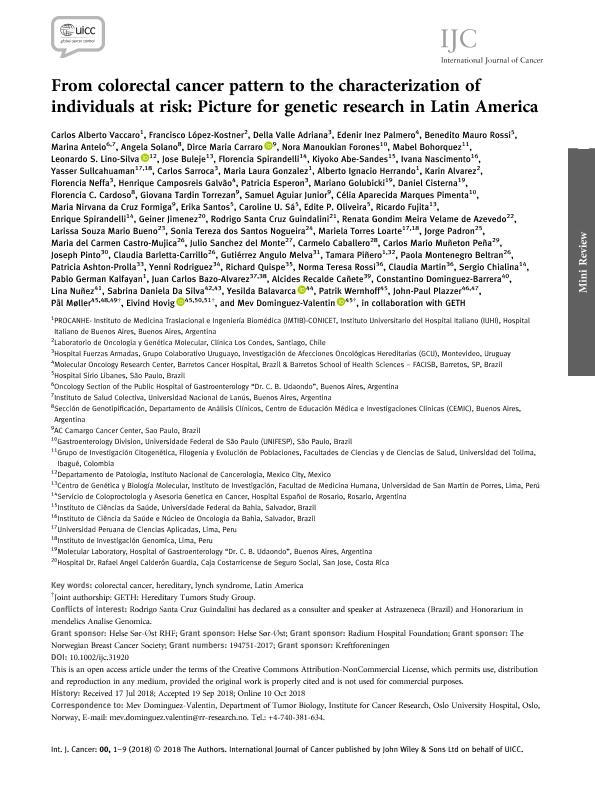Artículo
From colorectal cancer pattern to the characterization of individuals at risk: Picture for genetic research in Latin America
Vaccaro, Carlos Alberto; López Kostner, Francisco; Adriana, Della Valle; Inez Palmero, Edenir; Rossi, Benedito Mauro; Antelo, Marina ; Solano, Angela Rosario
; Solano, Angela Rosario ; Carraro, Dirce Maria; Forones, Nora Manoukian; Bohorquez, Mabel; Lino Silva, Leonardo S.; Buleje, Jose; Spirandelli, Florencia; Abe Sandes, Kiyoko; Nascimento, Ivana; Sullcahuaman, Yasser; Sarroca, Carlos; Gonzalez, Maria Laura; Herrando, Alberto Ignacio; Alvarez, Karin; Neffa, Florencia; Galvão, Henrique Camposreis; Esperon, Patricia; Golubicki, Mariano; Cisterna, Daniel; Cardoso, Florencia C.; Tardin Torrezan, Giovana; Aguiar Junior, Samuel; Aparecida Marques Pimenta, Célia; Nirvana da Cruz Formiga, María; Santos, Erika; Sá, Caroline U.; Oliveira, Edite P.; Fujita, Ricardo; Spirandelli, Enrique; Jimenez, Geiner; Santa Cruz Guindalini, Rodrigo; Gondim Meira Velame de Azevedo, Renata; Souza Mario Bueno, Larissa; dos Santos Nogueira, Sonia Tereza; Piñero, Tamara Alejandra
; Carraro, Dirce Maria; Forones, Nora Manoukian; Bohorquez, Mabel; Lino Silva, Leonardo S.; Buleje, Jose; Spirandelli, Florencia; Abe Sandes, Kiyoko; Nascimento, Ivana; Sullcahuaman, Yasser; Sarroca, Carlos; Gonzalez, Maria Laura; Herrando, Alberto Ignacio; Alvarez, Karin; Neffa, Florencia; Galvão, Henrique Camposreis; Esperon, Patricia; Golubicki, Mariano; Cisterna, Daniel; Cardoso, Florencia C.; Tardin Torrezan, Giovana; Aguiar Junior, Samuel; Aparecida Marques Pimenta, Célia; Nirvana da Cruz Formiga, María; Santos, Erika; Sá, Caroline U.; Oliveira, Edite P.; Fujita, Ricardo; Spirandelli, Enrique; Jimenez, Geiner; Santa Cruz Guindalini, Rodrigo; Gondim Meira Velame de Azevedo, Renata; Souza Mario Bueno, Larissa; dos Santos Nogueira, Sonia Tereza; Piñero, Tamara Alejandra
 ; Solano, Angela Rosario
; Solano, Angela Rosario ; Carraro, Dirce Maria; Forones, Nora Manoukian; Bohorquez, Mabel; Lino Silva, Leonardo S.; Buleje, Jose; Spirandelli, Florencia; Abe Sandes, Kiyoko; Nascimento, Ivana; Sullcahuaman, Yasser; Sarroca, Carlos; Gonzalez, Maria Laura; Herrando, Alberto Ignacio; Alvarez, Karin; Neffa, Florencia; Galvão, Henrique Camposreis; Esperon, Patricia; Golubicki, Mariano; Cisterna, Daniel; Cardoso, Florencia C.; Tardin Torrezan, Giovana; Aguiar Junior, Samuel; Aparecida Marques Pimenta, Célia; Nirvana da Cruz Formiga, María; Santos, Erika; Sá, Caroline U.; Oliveira, Edite P.; Fujita, Ricardo; Spirandelli, Enrique; Jimenez, Geiner; Santa Cruz Guindalini, Rodrigo; Gondim Meira Velame de Azevedo, Renata; Souza Mario Bueno, Larissa; dos Santos Nogueira, Sonia Tereza; Piñero, Tamara Alejandra
; Carraro, Dirce Maria; Forones, Nora Manoukian; Bohorquez, Mabel; Lino Silva, Leonardo S.; Buleje, Jose; Spirandelli, Florencia; Abe Sandes, Kiyoko; Nascimento, Ivana; Sullcahuaman, Yasser; Sarroca, Carlos; Gonzalez, Maria Laura; Herrando, Alberto Ignacio; Alvarez, Karin; Neffa, Florencia; Galvão, Henrique Camposreis; Esperon, Patricia; Golubicki, Mariano; Cisterna, Daniel; Cardoso, Florencia C.; Tardin Torrezan, Giovana; Aguiar Junior, Samuel; Aparecida Marques Pimenta, Célia; Nirvana da Cruz Formiga, María; Santos, Erika; Sá, Caroline U.; Oliveira, Edite P.; Fujita, Ricardo; Spirandelli, Enrique; Jimenez, Geiner; Santa Cruz Guindalini, Rodrigo; Gondim Meira Velame de Azevedo, Renata; Souza Mario Bueno, Larissa; dos Santos Nogueira, Sonia Tereza; Piñero, Tamara Alejandra
Fecha de publicación:
10/2018
Editorial:
John Wiley & Sons Inc.
Revista:
International Journal of Cancer. Journal International du Cancer
ISSN:
0020-7136
Idioma:
Inglés
Tipo de recurso:
Artículo publicado
Clasificación temática:
Resumen
Colorectal cancer (CRC) is one of the most common cancers in Latin America and the Caribbean, with the highest rates reported for Uruguay, Brazil and Argentina. We provide a global snapshot of the CRC patterns, how screening is performed, and compared/contrasted to the genetic profile of Lynch syndrome (LS) in the region. From the literature, we find that only nine (20%) of the Latin America and the Caribbean countries have developed guidelines for early detection of CRC, and also with a low adherence. We describe a genetic profile of LS, including a total of 2,685 suspected families, where confirmed LS ranged from 8% in Uruguay and Argentina to 60% in Peru. Among confirmed LS, path_MLH1 variants were most commonly identified in Peru (82%), Mexico (80%), Chile (60%), and path_MSH2/EPCAM variants were most frequently identified in Colombia (80%) and Argentina (47%). Path_MSH6 and path_PMS2 variants were less common, but they showed important presence in Brazil (15%) and Chile (10%), respectively. Important differences exist at identifying LS families in Latin American countries, where the spectrum of path_MLH1 and path_MSH2 variants are those most frequently identified. Our findings have an impact on the evaluation of the patients and their relatives at risk for LS, derived from the gene affected. Although the awareness of hereditary cancer and genetic testing has improved in the last decade, it is remains deficient, with 39%–80% of the families not being identified for LS among those who actually met both the clinical criteria for LS and showed MMR deficiency.
Palabras clave:
COLORECTAL CANCER
,
HEREDITARY
,
LATIN AMERICA
,
LYNCH SYNDROME
Archivos asociados
Licencia
Identificadores
Colecciones
Articulos (IMTIB)
Articulos de INSTITUTO DE MEDICINA TRASLACIONAL E INGENIERIA BIOMEDICA
Articulos de INSTITUTO DE MEDICINA TRASLACIONAL E INGENIERIA BIOMEDICA
Articulos(INBIOMED)
Articulos de INSTITUTO DE INVESTIGACIONES BIOMEDICAS
Articulos de INSTITUTO DE INVESTIGACIONES BIOMEDICAS
Citación
Vaccaro, Carlos Alberto; López Kostner, Francisco; Adriana, Della Valle; Inez Palmero, Edenir; Rossi, Benedito Mauro ; et al.; From colorectal cancer pattern to the characterization of individuals at risk: Picture for genetic research in Latin America; John Wiley & Sons Inc.; International Journal of Cancer. Journal International du Cancer; 145; 2; 10-2018; 318-326
Compartir
Altmétricas



